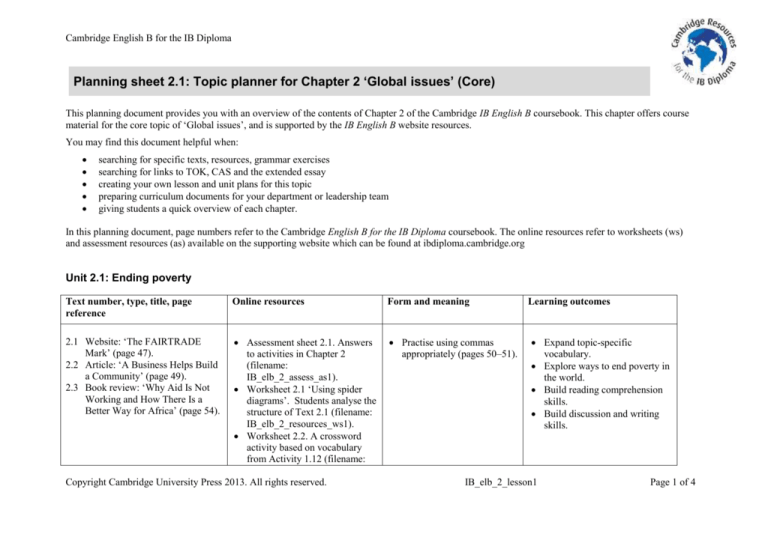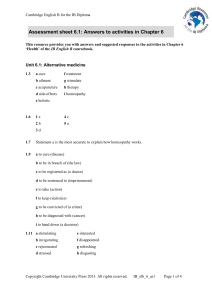
Cambridge English B for the IB Diploma
Planning sheet 2.1: Topic planner for Chapter 2 ‘Global issues’ (Core)
This planning document provides you with an overview of the contents of Chapter 2 of the Cambridge IB English B coursebook. This chapter offers course
material for the core topic of ‘Global issues’, and is supported by the IB English B website resources.
You may find this document helpful when:
searching for specific texts, resources, grammar exercises
searching for links to TOK, CAS and the extended essay
creating your own lesson and unit plans for this topic
preparing curriculum documents for your department or leadership team
giving students a quick overview of each chapter.
In this planning document, page numbers refer to the Cambridge English B for the IB Diploma coursebook. The online resources refer to worksheets (ws)
and assessment resources (as) available on the supporting website which can be found at ibdiploma.cambridge.org
Unit 2.1: Ending poverty
Text number, type, title, page
reference
Online resources
Form and meaning
2.1 Website: ‘The FAIRTRADE
Mark’ (page 47).
2.2 Article: ‘A Business Helps Build
a Community’ (page 49).
2.3 Book review: ‘Why Aid Is Not
Working and How There Is a
Better Way for Africa’ (page 54).
Assessment sheet 2.1. Answers
to activities in Chapter 2
(filename:
IB_elb_2_assess_as1).
Worksheet 2.1 ‘Using spider
diagrams’. Students analyse the
structure of Text 2.1 (filename:
IB_elb_2_resources_ws1).
Worksheet 2.2. A crossword
activity based on vocabulary
from Activity 1.12 (filename:
Practise using commas
appropriately (pages 50–51).
Copyright Cambridge University Press 2013. All rights reserved.
Learning outcomes
Expand topic-specific
vocabulary.
Explore ways to end poverty in
the world.
Build reading comprehension
skills.
Build discussion and writing
skills.
IB_elb_2_lesson1
Page 1 of 4
Cambridge English B for the IB Diploma
IB_elb_2_resources_ws2).
Worksheet 2.3 ‘Annotating an
advertisement’. Students
analyse and mark up the
Benetton ‘Africa Works’ ad, in
Activity 1.19 (filename:
IB_elb_2_resources_ws3).
Links to TOK
Links to Extended Essay
Links to learner profile
Students discuss the notion of
‘common beliefs’ in relation to key
global issues, using a map drawing
exercise (page 44).
A good Category 2b essay
might read ‘How and why have
Benetton ads been controversial
for the past twenty years?’
(page 54).
Caring – Students discuss
how much they care about,
and care for, people who are
less fortunate than
themselves (page 46).
Students discuss optical illusions in
relation to the Fairtrade logo (page
46).
Copyright Cambridge University Press 2013. All rights reserved.
Links to CAS
Students are invited to work on
a CAS project that helps
alleviate poverty (page 46).
Risk-takers – What risks
are there to microcredit
(page 49)?
IB_elb_2_lesson1
Page 2 of 4
Cambridge English B for the IB Diploma
Unit 2.2 – Global warming
Text number, type, title, page
reference
2.4 Opinion piece: ‘Is Global
Warming Real?’ (page 58).
2.5 Guidelines: ‘Greener living: a
quick guide’ (pages 61–63).
2.6 News article: ‘Bhamia,
Bangledesh – Global warming
has a taste in this village. It is the
taste of salt.’ (page 67).
Online resources
Worksheet 2.4 ‘Is global
warming real?’ Preparing a
presentation. Activity 2.8.
(filename:
IB_elb_2_resources_ws4).
Worksheet 2.5 ‘Global
warming awareness – using
images’, based on Activity
2.15. (filename:
IB_elb_2_resources_ws5).
Worksheet 2.6 ‘Marking up
Text 2.6’, looking for
adjectives and nouns.
(filename:
IB_elb_2_resources_ws6).
Form and meaning
Direct speech vs. reported
speech (pages 63–64).
Links to TOK
Links to Extended Essay
Links to learner profile
Students explore questions that
relate ‘ways of knowing’ to the
topic of global warming (page 58).
Suggested title: ‘How does Al
Gore use language to convince
people to care more about the
environment in An Inconvenient
Truth?’(page 66).
Principled – Discuss
responsibilities we have
towards preserving our
environment (page 61).
Copyright Cambridge University Press 2013. All rights reserved.
Learning outcomes
Expand topic-specific
vocabulary.
Discuss the reality and urgency
of global warming.
Build reading comprehension
skills.
Build discussion and writing
skills.
Links to CAS
Students discuss how they can
reduce their carbon footprint
(page 60).
IB_elb_2_lesson1
Page 3 of 4
Cambridge English B for the IB Diploma
Unit 2.3 – Speeches
Text number, type, title, page
reference
2.7 Speech: Diane Feinstein, ‘A time
to act’ (pages 69–70).
Online resources
Students learn more about
ethos, pathos, logos and various
rhetorical devices (pages 70–
71).
Form and meaning
Learning outcomes
Students learn about an
argumentation fallacy: the
false dilemma (page 72).
Students understand the range
of rhetorical features used in
speeches.
Students practice writing
speeches.
Learning outcomes
Unit 2.4 – Assessment: the interactive oral activity
Text number, type, title, page
reference
Online resources
Form and meaning
Documentary: it is suggested that
students watch parts of Al Gore’s
documentary film An Inconvenient
Truth.
Assessment sheet 2.2 ‘Planning
the interactive oral activity’,
which includes five steps to
help students prepare their
interactive oral activities
(filename:
IB_elb_2_assess_as2).
Assessment sheet 2.3
‘Assessing a sample interactive
oral’. Students assess an audio
recording of a sample
interactive oral activity.
(filename:
IB_elb_2_assess_as3).
Transcript of a sample
interactive oral activity
(pages 77–78).
Audio recording of the
sample interactive oral
activity on pages 77–78,
supplied with the online
resources for Chapter 2
(filename:
IB_elb_2_resources_ioa1).
Copyright Cambridge University Press 2013. All rights reserved.
Students become familiar with
the requirements for the
interactive oral.
Students understand methods
for preparing the interactive
oral.
Students become more familiar
with the assessment criteria for
the interactive oral.
IB_elb_2_lesson1
Page 4 of 4







